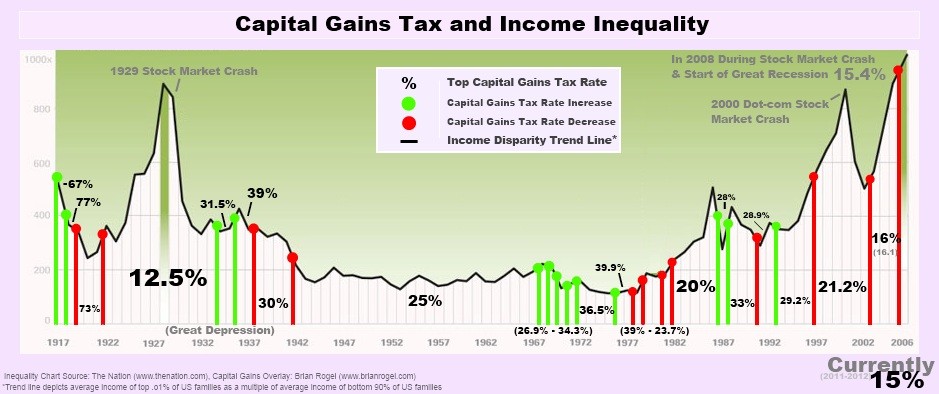STATE INCOME TAX ON CAPITAL GAINS
Post on: 22 Апрель, 2015 No Comment

By: Judith Lohman, Chief Analyst
You asked whether capital gains distributions are considered taxable income under Connecticut ‘ s personal income tax. You also asked if any other states exempt some or all capital gains from their income taxes.
SUMMARY
The federal tax code taxes net capital gains (gains minus losses) but at generally lower rates than other types of income. Federal tax rates on capital gains are lower for gains on assets held for more than one year. The federal tax law also exempts certain types and amounts of capital gains from taxation. The most notable federal exclusion is up to $500,000 in gains for joint filers from sale of a primary residence.
All 41 of the states with broad-based income taxes, including Connecticut, tax capital gains, but unlike the federal government, they do not typically have differential tax rates on such income. Fourteen states follow federal income tax rules and tax all net capital gains, while 27 provide various state exclusions and reductions for certain federally taxable capital gains. Connecticut excludes capital gains from the sale or exchange of Connecticut state or municipal bonds or notes from its income tax but follows the federal rules in all other respects.
Of the two states that tax only certain kinds of nonwage income, New Hampshire exempts all capital gains while Tennessee taxes capital gains distributions from mutual funds only.
FEDERAL CAPITAL GAINS TAXES
The federal capital gains tax laws are complicated. The following is a simplified description of the general rules for capital gains taxes on sales of most commonly held assets.
The federal government taxes net capital gains (capital gains minus capital losses), regardless of how long the assets were held. But until December 31, 2010, net capital gains are taxed at a lower rate than ordinary income. For taxpayers whose top marginal rate is 25% or higher, gains on assets held for more than one year (long-term capital gains) are taxed at a maximum 15% rate. For taxpayers in the 10% and 15% brackets, the maximum rate for long-term capital gains is 5% for sales through December 31, 2007 and zero for sales during 2008 through 2010.
After 2010, capital gains tax rates are scheduled to revert to the rates that were in effect prior to May 6, 2003; that is, 20% generally and 10% for taxpayers in the 15% bracket. Special rates of 18% and 8% will apply for sales of certain capital assets held for more than five years when the taxpayer is in the 10% or 15% bracket.
Under both rate structures, higher rates apply to gains from sales of certain types of assets, such as collectibles and qualified small business stock. Up to $250,000 of capital gains ($500,000 for joint filers) from the sale of a taxpayer ‘ s primary residence is exempt if the taxpayer meets certain conditions.
Taxpayers can reduce their taxable capital gains by subtracting their capital losses. Net capital losses are deductible from ordinary income up to a maximum of $1,500 per year ($3,000 for joint filers). Taxpayers can carry forward any excess capital losses to offset taxable income in future years.
CONNECTICUT ‘ S CAPITAL GAINS EXCLUSIONS
The starting point for Connecticut ‘ s income tax is federal adjusted gross income (AGI), as listed on line 37 of IRS Form 1040, line 21 of Form 1040A, or Line 4 of Form 1040EZ. When calculating AGI, both Forms 1040 and 1040A require a taxpayer to include capital gains distributions, determined under the rules described above (Line 13 on Form 1040 and Line 10 on Form 1040A).
To determine Connecticut taxable income, Connecticut requires a taxpayer to make various additions to and subtractions from federal AGI. Under federal law, capital gains and losses on state and municipal bonds are treated the same as gains and losses on other assets. But Connecticut ‘ s income tax exempts gains from sales of Connecticut state or municipal bonds from state income tax. Thus, it requires taxpayers to subtract any such capital gains (and add back any capital losses) from their federal AGI when figuring their Connecticut taxes (CGS §12-701 (20)(A)(v) and (20)(B)(vii)).
With the exception of capital gains and losses from Connecticut state or municipal bonds, Connecticut follows the federal tax law for capital gains and losses.
CAPITAL GAINS EXCLUSIONS IN OTHER STATES
All states with state income taxes start with the federal definition of taxable capital gains. But in determining taxable income for state tax purposes, many states exclude certain capital gains that are taxable under the federal tax law. Table 1 shows how each state treats federally taxable capital gains income for state income tax purposes.
Information on capital gains income treatment in other states is based on a compilation of Individual Income Tax Provisions in the States by the Wisconsin Legislative Fiscal Bureau (January 2007). Since the Wisconsin report applies to the 2005 tax year, we updated the information by checking state income tax forms and instructions for the 2007 tax year.
Table 1: State Income Tax Treatment of Capital Gains & Losses














